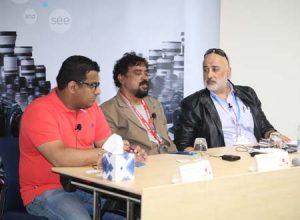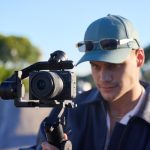Canon Middle East hosted a roundtable discussion with cinematographers on the final day of CABSAT 2015. The discussion titled Canon Take Four invited camera experts working in different genres from the region and beyond, who shared their experience with the attendees. The panellists included celebrated Indian cinematographer Santhosh Sivan, Antoine Atyeh, cameraman supervisor at Al Arabiya […]

Canon Middle East hosted a roundtable discussion with cinematographers on the final day of CABSAT 2015. The discussion titled Canon Take Four invited camera experts working in different genres from the region and beyond, who shared their experience with the attendees.
The panellists included celebrated Indian cinematographer Santhosh Sivan, Antoine Atyeh, cameraman supervisor at Al Arabiya News, Sheirf Mokbel, DoP at Circus Studios, Khaled Gamal, shortlisted candidate for Canons EOS short film competition and Mohammed Albsimi, Editor at Electrony.net. The discussion was moderated by BroadcastPro ME Editor Vijaya Cherian.
The objective of the discussion was to help youngsters understand digital cinematography better. The attendees included film students and young filmmakers.
The discussion began with how a cinematographer chooses a camera as each panellist spoke about his style of working and what criteria they keep in mind while choosing the right camera for a particular project.
Sivan spoke about his journey in filmmaking and what triggered his interest in films. He emphasised the importance of travel for filmmakers to learn and perfect their craft.
He said that a film is designed as a composition where each shot contributes to a create a particular scene that is artistically spectacular in order to tell a story.
“Not every scene in a film is great, but each scene works towards creating one great scene, a crescendo,” said Sivan.
Atyeh touched upon the importance of timing in news and how news cameramen need to understand the process of editing.
News capture doesnt end at capturing the film, editing is an inherent part of it, said Atyeh.
Filmmakers on the panel said that time is a key criterion for filmmaking.
Timing is everything, no matter what content you shoot. You have to have an eye for what will capture the viewers attention, said Sivan.
The panel moved forward from how art merges with technology and how the cameraman can use technology to his advantage. Depending on what the film is about and the demand of the script, the cinematographer selects his camera and lenses. The panellists also advised to test the camera for every project to test its specs before zeroing on one.
The discussion also touched upon the commonalities and differences of shooting various genres of film. The panellists agreed that a film should establish a connection with viewers and convey the right message, which in turn means that the cinematographer should be able to speak to the audience through film.
















































































